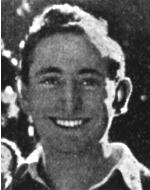Caspi, Yosef (Sefi)
Son of Slava and Aryeh was born on June 12, 1924 in Tel Aviv, and he was honest and honest in his childhood, and he told his parents openly and with guilt about his actions, which caused him to be rebuked at times in kindergarten or school. At the age of 10 (after a fatal illness, brain hemorrhage), he joined the “Chugim” movement and after a conversation with the club announced his retirement from the music: “We do not need pianists , We need workers and I want to be a worker. “During his studies at the Shalva Gymnasium, When he was allowed to leave the camp with his group for a second time, he was forced to leave the camp for a second time, but due to organizational troubles, he neglected his lessons a bit. “Although he wanted to enlist in the British army or at least to report to the Palmach, he was forced to accept the law of the movement and remain in the city for guidance, even though he was one of the initiators and activists for mobilization Members of his class to the Palmach. After completing his studies at the Gymnasium, he went with his fellow members to a training course in Yagur. His letters to his parents and his girlfriend from the training year shed light on his personality and on the very process of turning an urban boy into a kibbutz. After the training he went to work in the quarry in order to get to know the municipal worker, and this recognition reinforced his desire for co-existence in an agricultural farm. After completing a seminar of the movement he spent two years in training. These two years of full mobilization were years of intense and alert activity that shaped the image of dozens of loyal and committed students on their way. After these two years he immigrated with members of his movement and settled in Beit Keshet in the framework of the Palmach nucleus, where he tended to afforestation and all work in the farm and even to work outside the building for the purpose of training in subjects that the kibbutz would need. In his letters to his uncle in America, he tried to explain to him the goals of the kibbutz and the struggle of the Yishuv in power “We will do everything to bring Jews. Here, too, there will be no peace here. You know, here we will not die as Jews in the camps in Poland and Germany. “Then,” For me, death with dignity is a disgrace. You understand, therefore, that my private life is part of the life of the Jewish people. If our hope is finished, then the building of my private life will be broken … “And on a short visit to the house, he said to his parents:” It is not time to cry now, you have to gnash your teeth, bite your lips and overcome! Yosef participated in the defense of Beit Keshet and the surrounding area, and on the 17th of Adar 2, 5708 (March 16, 1948), he went with seven members of Beit Keshet to tour the area. They were attacked from ambush by a gang of hundreds of Arab tribesmen who surrounded them. One managed to escape to the kibbutz and call for reinforcements. The seven remaining young men fought heroically to the last ball and all fell. After three days of tedious negotiations, their bodies were returned. Joseph was brought to eternal rest in the Beit Keshet cemetery. He left behind his parents. The Mahanot Ha’olim movement published a book in his memory that contained lines for his character and letters he wrote to his family.
